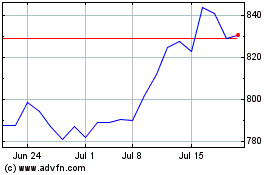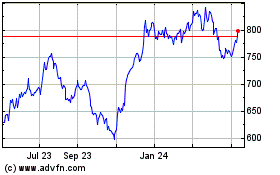Saba Can Nominate Slate to BlackRock Fund Boards, Delaware Court Says
June 28 2019 - 1:23PM
Dow Jones News
By Gretchen Morgenson
Saba Capital Management LP, a $1.7 billion hedge fund, will be
allowed to nominate outsiders to the boards of two BlackRock Inc.
closed-end funds.
The decision by Delaware Chancery Court comes after Saba filed a
lawsuit against the world's largest asset manager last month. In
Thursday's ruling, the court said that the BlackRock funds had
overstepped their authority when they demanded extensive
information about the dissidents' backgrounds ahead of the funds'
annual meetings.
Saba, run by Boaz Weinstein, had alleged that BlackRock was
trying to block outsiders from gaining board seats and effecting
change at the BlackRock Credit Allocation Income Trust and
BlackRock New York Municipal Bond Trust.
Saba also sued in Maryland over its holdings in the BlackRock
Muni New York Intermediate Duration Fund. The court has yet to rule
in that case.
When the suits were filed, BlackRock said Saba was trying to
enrich itself at the expense of the funds' long-term shareholders.
The annual meeting of the Credit Allocation Income trust is
scheduled for July 8.
"This is a win for all shareholders and for board
accountability," Mr. Weinstein said in a statement.
A BlackRock spokesman declined to comment on the Delaware
ruling. BlackRock can appeal the decision before the July 8
meeting.
Closed-end funds, whose shares trade on exchanges, can sell at a
discount to the value of the assets they hold, based on supply and
demand. All three of the BlackRock funds have recently traded at
discounts, although they have narrowed this month.
Saba is a big investor in closed-end funds, hoping to profit by
narrowing their discounts and bringing share prices in line with
the underlying assets' value. Strategies include agitating for
governance changes among the funds such as converting them to
open-ended portfolios or selling the underlying assets and
returning money to shareholders.
In March, Saba announced it would nominate four candidates to
one BlackRock fund board and supplied information regarding those
candidates to be included in proxy materials. BlackRock demanded
the nominees answer an additional 47-page questionnaire within five
business days. After Saba missed the deadline, BlackRock said the
nominations were invalid and votes for the dissidents wouldn't be
counted. Saba then sued.
Delaware Chancery Court Vice Chancellor Morgan T. Zurn ruled
with Saba on one of its allegations -- that BlackRock breached its
bylaws when it demanded the additional information on the dissident
directors to be delivered within five days. The court ruled that
BlackRock defendants had exceeded the scope of the funds' bylaws by
demanding the extra material and found that the questionnaire "was
not 'reasonably requested' or 'necessary' " to determine whether
Saba's nominees met requirements.
The court didn't decide on a Saba claim that the BlackRock
questionnaire aimed to limit outsiders' ability to effect change at
the funds' boards. The court left that matter open, saying that
Saba hadn't presented enough proof.
Write to Gretchen Morgenson at gretchen.morgenson@wsj.com
(END) Dow Jones Newswires
June 28, 2019 13:08 ET (17:08 GMT)
Copyright (c) 2019 Dow Jones & Company, Inc.
BlackRock (NYSE:BLK)
Historical Stock Chart
From Mar 2024 to Apr 2024

BlackRock (NYSE:BLK)
Historical Stock Chart
From Apr 2023 to Apr 2024
